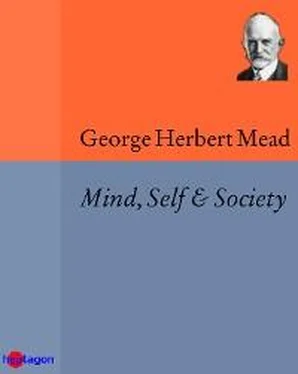George Herbert Mead - Mind, Self & Society
Здесь есть возможность читать онлайн «George Herbert Mead - Mind, Self & Society» — ознакомительный отрывок электронной книги совершенно бесплатно, а после прочтения отрывка купить полную версию. В некоторых случаях можно слушать аудио, скачать через торрент в формате fb2 и присутствует краткое содержание. Жанр: unrecognised, на английском языке. Описание произведения, (предисловие) а так же отзывы посетителей доступны на портале библиотеки ЛибКат.
- Название:Mind, Self & Society
- Автор:
- Жанр:
- Год:неизвестен
- ISBN:нет данных
- Рейтинг книги:3 / 5. Голосов: 1
-
Избранное:Добавить в избранное
- Отзывы:
-
Ваша оценка:
- 60
- 1
- 2
- 3
- 4
- 5
Mind, Self & Society: краткое содержание, описание и аннотация
Предлагаем к чтению аннотацию, описание, краткое содержание или предисловие (зависит от того, что написал сам автор книги «Mind, Self & Society»). Если вы не нашли необходимую информацию о книге — напишите в комментариях, мы постараемся отыскать её.
Mind, Self & Society — читать онлайн ознакомительный отрывок
Ниже представлен текст книги, разбитый по страницам. Система сохранения места последней прочитанной страницы, позволяет с удобством читать онлайн бесплатно книгу «Mind, Self & Society», без необходимости каждый раз заново искать на чём Вы остановились. Поставьте закладку, и сможете в любой момент перейти на страницу, на которой закончили чтение.
Интервал:
Закладка:
There remain contents, such as those of imagery, which are more resistant to such analysis. What shall we say of responses that do not answer to any given experience? We can say, of course, that they are the results of past experiences. But take the contents themselves, the actual visual imagery that one has: it has outline; it has color; it has values; and other characters which are isolated with more difficulty. Such experience is one which plays a part, and a very large part, in our perception, our conduct; and yet it is an experience which can be revealed only by introspection. The behaviorist has to make a detour about this type of experience if he is going to stick to the Watsonian type of behavioristic psychology.
Such a behaviorist desires to analyze the act, whether individual or social, without any specific reference to consciousness whatever and without any attempt to locate it either within the field of organic behavior or within the larger field of reality in general. He wishes, in short, to deny its existence as such altogether. Watson insists that objectively observable behavior completely and exclusively constitutes the field of scientific psychology, individual and social. He pushes aside as erroneous the idea of »mind« or »consciousness«, and attempts to reduce all »mental« phenomena to conditioned reflexes and similar physiological mechanisms – in short, to purely behavioristic terms. This attempt, of course, is misguided and unsuccessful, for the existence as such of mind or consciousness, in some sense or other, must be admitted – the denial of it leads inevitably to obvious absurdities. But though it is impossible to reduce mind or consciousness to purely behavioristic terms – in the sense of thus explaining it away and denying its existence as such entirely – yet it is not impossible to explain it in these terms, and to do so without explaining it away, or denying its existence as such, in the least. Watson apparently assumes that to deny the existence of mind or consciousness as a psychical stuff, substance, or entity is to deny its existence altogether, and that a naturalistic or behavioristic account of it as such is out of the question. But, on the contrary, we may deny its existence as a psychical entity without denying its existence in some other sense at all; and if we then conceive it functionally, and as a natural rather than a transcendental phenomenon, it becomes possible to deal with it in behavioristic terms. In short, it is not possible to deny the existence of mind or consciousness or mental phenomena, nor is it desirable to do so; but it is possible to account for them or deal with them in behavioristic terms which are precisely similar to those which Watson employs in dealing with non-mental psychological phenomena (phenomena which, according to his definition of the field of psychology, are all the psychological phenomena there are). Mental behavior is not reducible to non-mental behavior. But mental behavior or phenomena can be explained in terms of non-mental behavior or phenomena, as arising out of, and as resulting from complications in, the latter.
If we are going to use behavioristic psychology to explain conscious behavior we have to be much more thoroughgoing in our statement of the act than Watson was. We have to take into account not merely the complete or social act, but what goes on in the central nervous system as the beginning of the individual's act and as the organization of the act. Of course, that takes us beyond the field of our direct observation. It takes us beyond that field because we cannot get at the process itself. It is a field that is more or less shut off, seemingly because of the difficulty of the country itself that has to be investigated. The central nervous system is only partly explored. Present results, however, suggest the organization of the act in terms of attitudes. There is an organization of the various parts of the nervous system that are going to be responsible for acts, an organization which represents not only that which is immediately taking place, but also the later stages that are to take place. If one approaches a distant object he approaches it with reference to what he is going to do when he arrives there. If one is approaching a hammer he is muscularly all ready to seize the handle of the hammer. The later stages of the act are present in the early stages – not simply in the sense that they are all ready to go off, but in the sense that they serve to control the process itself. They determine how we are going to approach the object, and the steps in our early manipulation of it. We can recognize, then, that the innervation of certain groups of cells in the central nervous system can already initiate in advance the later stages of the act. The act as a whole can be there determining the process.
We can also recognize in such a general attitude toward an object an attitude that represents alternative responses, such as are involved when we talk about our ideas of an object. A person who is familiar with a horse approaches it as one who is going to ride it. He moves toward the proper side and is ready to swing himself into the saddle. His approach determines the success of the whole process. But the horse is not simply something that must be ridden. It is an animal that must eat, that belongs to somebody. It has certain economic values. The individual is ready to do a whole series of things with reference to the horse, and that readiness is involved in any one of the many phases of the various acts. It is a horse that he is going to mount; it is a biological animal; it is an economic animal. Those characters are involved in the ideas of a horse. If we seek this ideal character of a horse in the central nervous system we would have to find it in all those different parts of the initiated acts. One would have to think of each as associated with the other processes in which he uses the horse, so that no matter what the specific act is, there is a readiness to act in these different ways with reference to the horse. We can find in that sense in the beginning of the act just those characters which we assign to »horse« as an idea, or if you like, as a concept.
If we are going to look for this idea in a central nervous system we have to look for it in the neurons, particularly in the connection between the neurons. There are whole sets of connections there which are of such a character that we are able to act in a number of ways, and these possible actions have their effect on the way in which we do act. For example, if the horse belongs to the rider, the rider acts in a different way than if it belongs to someone else. These other processes involved determine the immediate action itself and particularly the later stages of the act, so that the temporal organization of the act may be present in the immediate process. We do not know how that temporal organization takes place in the central nervous system. In some sense these later processes which are going to take place, and are in some sense started, are worked into the immediate process. A behavioristic treatment, if it is made broad enough, if it makes use of the almost indefinite complexities existing in the nervous system, can adjust itself to many fields which were supposed to be confined to an introspective attack. Of course, a great deal of this must be hypothetical. We learn more day by day of what the connections are, but they are largely hypothetical. However, they can at least be stated in a behavioristic form. We can, therefore, in principle, state behavioristically what we mean by an idea.
3. THE BEHAVIORISTIC SIGNIFICANCE OF GESTURES
The behaviorist of the Watsonian type has been prone to carry his principle of conditioning over into the field of language. By a conditioning of reflexes the horse has become associated with the word »horse«, and this in turn releases the set of responses. We use the word, and the response may be that of mounting, buying, selling, or trading. We are ready to do all these different things. This statement, however, lacks the recognition that these different processes which the behaviorist says are identified with the word »horse« must be worked into the act itself, or the group of acts, which gather about the horse. They go to make up that object in our experience, and the function of the word is a function which has its place in that organization; but it is not, however, the whole process. We find that same sort of organization seemingly extended in the conduct of animals lower than man: those processes which go to make up our objects must be present in the animals themselves who have not the use of language. It is, of course, the great value, or one of the great values, of language that it does give us control over this organization of the act. That is a point we will have to consider in detail later, but it is important to recognize that that to which the word refers is something that can lie in the experience of the individual without the use of language itself. Language does pick out and organize this content in experience. It is an implement for that purpose.
Читать дальшеИнтервал:
Закладка:
Похожие книги на «Mind, Self & Society»
Представляем Вашему вниманию похожие книги на «Mind, Self & Society» списком для выбора. Мы отобрали схожую по названию и смыслу литературу в надежде предоставить читателям больше вариантов отыскать новые, интересные, ещё непрочитанные произведения.
Обсуждение, отзывы о книге «Mind, Self & Society» и просто собственные мнения читателей. Оставьте ваши комментарии, напишите, что Вы думаете о произведении, его смысле или главных героях. Укажите что конкретно понравилось, а что нет, и почему Вы так считаете.












